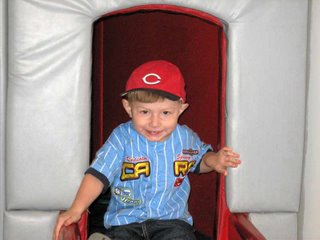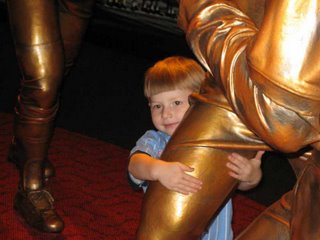
I haven't been able to post anything about the Cincinnati Reds game I attended two weeks ago. I'm happy to say that my friend, Eric, e-mailed me the digital pictures from the game today, and I am posting them within minutes of seeing them for the first time myself.
Our day began in Newport, KY, just across the river from Cincinnati. We met Eric and his girlfriend, Julie, at a shopping mall there, and then we walked across the river to Great American Ballpark, home of the Reds. Our first stop at the ballpark was the Cincinnati Reds Hall of Fame and Museum, just outside the park. They had a cool kids' place in the museum which had a slide and a clubhouse for the kids. Jonah had his Reds' hat on (Owen and Ellie were at a school field day).

Next to the slide was a locker room. We dressed Jonah up in a red-sripted jersey and gave him a bat and a glove. You can't tell, but the jersey had the number of Barry Larkin, an all-star shortstop from the 90s. While Jonah was posing, Eric and I took some practice pitches in a pitching cage. It's cool, you throw pitches, and a radar gun will give you your speed and tell whether it was a strike or a ball. People can also stand behind home plate and look through plexiglass to see how fast the pitches are coming. I topped out at 62 mph.
There were a number of fascinating things at the museum. The coolest thing for me was the display of 4,256 baseballs, which equals the American record for hits by Pete Rose, the player who was my favorite growing up. I had two posters of him in my room, and I modeled my game after him in every way. Well, the hits exhibit is impressive. The balls are lined up in rows about 20 feet wide, and they ascend 3 1/2 stories! It really puts into perspective what an incredible record Rose holds. (For those who aren't baseball fans, Pete Rose is a legend--the street in front of the stadium is called "Pete Rose Way"--but he is not allowed to work for the Reds or take an official part in any major league baseball game because he bet on baseball games as a manager in 1988 and 1989.)
One exhibit that Jonah recognized was the room that featured Cincinnati's 1919 World Series victory over the heavily favored Chicago White Sox. Ten months after the Reds won, word leaked out that several White Sox players had accepted payments from gamblers to "throw" games. One of the White Sox players implicated in the gambling inquiry was "Shoeless" Joe Jackson--his average for the series was .375, so it is hard to make a case that he actually played poorly. All eight players who took money from gamblers were banned from baseball for life--sort of like Pete Rose is currently banned. Jonah's nickname over the summer was "Shoeless  Jo," because he refused to wear shoes of any kind!
Jo," because he refused to wear shoes of any kind!
They have a big exhibit on the Big Red Machine, teams that went to the World Series four times during the 1970s. In the middle of the exhibit are statues of eight Reds players celebrating the 1975 championship: Joe Morgan, Johnny Bench, Cesar Geronimo, Ken Griffey, Sr., George Foster, Dave Concepcion, Tony Perez, and Pete Rose. Jonah immediately tried to climb on the statues. As it turned out, the player whose leg he chose to climb was his daddy's favorite, Pete Rose!
The game gave Eric and me a chance to catch up on the last 12 years of our lives. Eric sells sports tickets and sports memorabilia on E-bay and makes a nice living for himself. His girlfriend, Julie, is pregnant with their first child, a girl due in January. We started the game with neat seats, front row in the left field bleachers. We made it through the first five innings there, after which we got up to look around the ballpark. There were plenty of porches from which to watch the game. The Chicago Cubs jumped out to a 2-1 lead, which held until the 9th inning.
By this time, we had found our way to seats on the 1st-base line. The Reds came up in the bottom of the 9th inning to fact Ryan Dempster. I was excited, because Dempster used to pitch for the Reds and he used to lose game after game for them in the late innings.
Sure enough, the Reds loaded the bases, and a wild pitch by Dempster allowed the tying run to score. With the bases loaded and one out, Royce Clayton came up to bat. (The picture at right shows the final at-bat. You can see the bases loaded. If you look at the scoreboard along the left-field wall, you can see where we were sitting at the beginning of the game.)
I was going crazy. I went to one Reds game a summer from the ages of 11 and 18. It seemed like they always lost. Yet here I was, eleven again, jumping and shouting and screaming. Unfortunately, Jonah had fallen asleep on my shoulder. Somehow he slept through all the clapping and chants of "Charge!" and "Let's Go Reds!"
Clayton came up with the score tied. He hit a sharp single to left, just beyond the reach of the diving third baseman. The Reds had won the game in exciting fashion.
 It was beyond the best game I had ever attended; it was beyond an excellent chance to reconnect with my best friend; it was beyond the bizarre aspect of time travel that let me re-live being an eleven-year-old kid while supervizing my own three-year-old son. I just can't describe all the memories and emotions that I went through that day.
It was beyond the best game I had ever attended; it was beyond an excellent chance to reconnect with my best friend; it was beyond the bizarre aspect of time travel that let me re-live being an eleven-year-old kid while supervizing my own three-year-old son. I just can't describe all the memories and emotions that I went through that day.
After the game, Eric gave me a special gift: four packs of unopened Fleer baseball cards from 1981, the year he and I had begun collecting baseball cards together. He had bought them at a card convention, and he had saved a few packs to give me for memory's sake. "They still have gum!" he exclaimed, referring to the pink sticks of gum that used to come with the cards. I gave one pack to Jonah, Ellie and Owen, and I opened one for myself. (I would not let any of the kids eat the gum, just for the record, which was 25 years old!)
The first thing I noticed was the smell: gum, cardboard, and the wax paper. Next came the feeling of the cards in my fingers. My thumb went into action, thumbing through the cards, looking for memorable players. It's like my thumb had a memory, because it just took off through those cards, just as it had done thousands of times with tens of thousands of cards when I was a kid.
It proved to be a long day. Jonah and I left at 5:15 that morning and returned around 9 that night. It was worth every minute, because it reconnected me with parts of my life I had nearly forgotten.
One baseball game. One pack of cards. One lifelong friend. My lifetime. That's what one afternoon in Cincinnati did for me.






